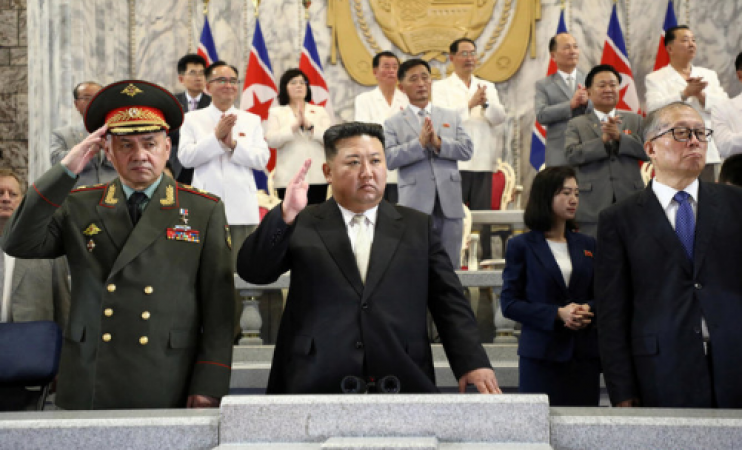
Seoul: The North Korean leader, Kim Jong Un, shared the stage with senior representatives from Russia and China as he unveiled his most potent nuclear-capable missiles in a military parade in Pyongyang, marking a significant war anniversary with a show of defiance against Washington and strengthening ties with Moscow at a time when tensions on the peninsula are at an all-time high.
According to state media, Kim watched the parade on Thursday night from a balcony overlooking the brightly lit Kim Il Sung Square, which bears his grandfather's name: the founding father of North Korea, along with the Russian Defence Minister Sergei Shoigu and a representative of the Chinese ruling party, Li Hongzhong.
Tens of thousands of mobilised spectators filled the streets and stands, cheering as waves of goose-stepping soldiers, tanks, and massive intercontinental ballistic missiles wheeled out on launcher trucks crowded the main road. According to KCNA reports, people have recently been brought in from all over the nation to fill the crowd.
Also Read: Russia claims to have stopped a drone attack from Ukraine near Moscow
Photos showed Shoigu and Li standing to his right and left at the middle of the balcony, smiling and chatting with Kim Jong Un, and Kim and Shoigu raising their hands to salute the parading troops. KCNA made no mention of Kim giving a speech.
According to the North's official Korean Central News Agency, the parade included ceremonial flights of recently created surveillance and attack drones. These drones were first unveiled this week as state media covered an arms exhibition that Kim and Shoigu attended.
The Hwasong-17 and Hwasong-18, two new ICBMs that have recently undergone flight testing and displayed ranges that could extend far into the US mainland, were unveiled as the parade's grand finale. These missiles are allegedly based on Russian designs, according to some analysts.
Speaking at the parade, North Korea's defence minister Kang Sun Nam referred to it as a historic celebration of the nation's "great victory against the American imperialists and the forces of their follower nations."
He criticised the US for escalating military drills with South Korea, which the North characterises as invasion drills. The allies characterise their exercises as defensive and claim that new training standards are required to address the North's evolving nuclear threat.
Kang declared, "(The) enemies have made a self-defeating final decision that will undoubtedly seal their fate.
Also Read: Australia Exudes Confidence in US Nuclear Submarines Amid Ministerial Meetings
The United States, according to Kang, "does not have an option where it could use nuclear weapons against us and survive."
Satellites have recently had trouble observing the preparations for the parade, which took place at night, due to clouds over Pyongyang.
At 10:16 p.m. local time on Thursday, at 13:16 GMT, satellite images appeared to show a crowd gathered in the square, according to Dave Schmerler, a senior research associate at the Middlebury Institute of International Studies at Monterey's James Martin Centre for Nonproliferation Studies.
Since the beginning of the pandemic, North Korea's invitation of Chinese and Russian delegates represented a rare diplomatic opening. According to experts, Kim is attempting to emerge from his diplomatic exile and increase the visibility of his alliance with autocratic allies in order to resist pressure from the United States.
The parade came after talks between Kim and Shoigu this week in Pyongyang, which showed North Korea's support for Russia's invasion of Ukraine and increased suspicions that the North was prepared to provide arms to Russia, whose war efforts have been hampered by issues with defence inventory and procurement.
Vladimir Putin thanked Kim for North Korea's "firm support" of his war efforts in Ukraine in a letter that was published by KCNA on Thursday. Putin claimed that Moscow and Pyongyang's interests were converging as they fought against the "policy of the Western group which hinders the establishment of the truly multi-polarized and just world order."b
Following a second day of discussions about enhancing the nations' "strategic and tactical collaboration and cooperation" in defence and security, Kim also hosted a luncheon and dinner banquet for Shoigu and his delegation, according to KCNA.
UN member states should increase vigilance for observing and punishing sanctions violations, according to Leif-Eric Easley, a professor at Ewha University in Seoul. "Given Russia's need for ammunition for its illegal war in Ukraine and Kim Jong Un's willingness to personally give the Russian defence minister a tour of North Korea's arms exhibition," he added.
The presence of China at North Korea's parade of nuclear-capable missiles, he continued, "raises serious questions about Beijing's complicity in Pyongyang's threats to international security."
The celebrations in North Korea for the armistice that ended hostilities in the 1950–1953 Korean War were concluded by the parade. Chinese troops and the then-Soviet air force supported North Korea, which started the war by surprising the South in June 1950. Under the auspices of the UN, South Korea, the US, and troops from other countries fought to repel the invasion.
The Korean Peninsula remains technically at war as a result of the July 1953 truce, which the North still views as a victory in the "Grand Fatherland Liberation War."
The commemorative activities were more solemn in South Korea, where President Yoon Suk Yeol paid respect to the foreign soldiers who lost their lives while fighting for the South during the war by visiting a war cemetery in the city of Busan.
Also Read: Putin informs the African leaders Moscow is examining their peace plan for Ukraine
Yoon has pushed to increase South Korea's military drills with the US and is looking for stronger US guarantees that it would use its nuclear arsenal to defend the South in the event of a nuclear attack in response to rising North Korean threats.
In a statement commemorating the anniversary, UN Secretary-General Antonio Guterres also voiced concern over what he called a growing "nuclear risk" on the Korean Peninsula.
He urged the parties to foster a dialogue-friendly environment by resuming routine diplomatic contacts.